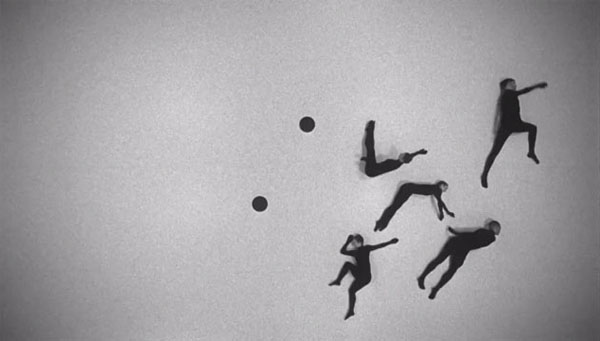“A 54-minute ‘essay film’ that refers to IRA martyrdom, Marxist theory and anthropomorphic ketchup dispensers as it explores the value of art won its maker Duncan Campbell the 2014 Turner prize,” reports Mark Brown for the Guardian. “It was by no means a surprise. Campbell, aged 42 and probably the best known of the four artists shortlisted, had been the bookmakers’ favorite all along to take a prize created 30 years ago to ‘promote discussion of new developments in contemporary British art.’ His film, It for Others, was first seen at the Scottish pavilion of the Venice Biennale in the summer of 2013.”
What was a surprise about this year’s shortlist, as I noted in May, is that three out of this year’s group of four artists are filmmakers—or at the very least, they incorporate filmmaking into their work. Besides Campbell, we had James Richards and Tris Vonna-Michell—and printmaker Ciara Phillips.
“For me, Duncan Campbell is the standout artist,” wrote the BBC’s Will Gompertz earlier today. But back in May, the Guardian‘s Adrian Searle wrote that”Campbell’s film was concocted from a strange mix of footage: African masks and other artefacts, images of perfume bottles and snack packaging, and shots from a dance piece by British choreographer Michael Clark in which the performers, shot from above, contort themselves into the shapes of equations. Campbell’s film was not without its pleasures, but was terribly long. It lost me somewhere.”
Talking with Campbell for the Observer in October, Vanessa Thorpe noted that the film also “takes a swipe at the British Museum, mentioning its director, the venerated Neil MacGregor, by name. His film is a response to an admired 1953 French documentary film made by Chris Marker and Alain Resnais called Statues Also Die, which set out to show how symbolic artefacts taken from Africa and placed in the London museum immediately lost much of their meaning and, worse, had other, handier meanings foisted upon them by western academics. ‘The issue of repatriation is incredibly complicated and there are some arguments I don’t agree with on both sides,’ said Campbell, ‘but there are very compelling arguments about the ownership of these objects, to do with how they are used and with who gets to draw the limits on the sort of knowledge that is drawn from them.'”
Update, 12/9: “Art critics have begun to question the relevance of the Turner Prize following Duncan Campbell’s win.” The BBC gathers the evidence. They’ve missed one, though. Rachel Spence argues in the Financial Times that It for Others “manages to be both suffocatingly earnest and infuriatingly superficial.”
For news and tips throughout the day every day, follow @KeyframeDaily. Get Keyframe Daily in your inbox by signing in at fandor.com/daily.




